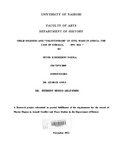| dc.description.abstract | This study examines the recruitment of child soldiers in Somalia, the roles pla1ed by them and the impact of the conflict on children in Somalia. The study concentrated on child soldiers, their relatives including parents and other informants that had interacted with them one way or another. Officials from various groups involved in the interventions in whatever capacity were interviewed including those working with UNHCR, UNICEF and other NGOs. The study employed both primary and secondary data. Secondary data was obtained from books, journal articles and relevant internet sources. Gaps found in secondary data were filled by conducting thorough oral interviews where fifty persons including former child soldiers were interviewed.
Somalia has lacked a national government since the fall of Mohammed SiadBarre's dictatorship in 1991. Rival armed groups were embroiled in armed struggle that plunged the country into civil war. The US and UN humanitarian and military interventions from 1993 to 1995 failed to restore peace. Since then, various groupings of Somali factions, mostly clan based sought to control the national territory or portions thereof and have been fighting for slightly over twenty years now. Furthermore, external forces and actors mostly led by interests other than for Somalia have made matters worse by supporting various groups and persons in Somalia. Thishas complicated and protracted the conflict. It is in the prevailing environment that many children have found their way into the war through the many warring groups involved in the conflict.
Often, cruel methods of forced recruitment of child soldiers are popular images used in the academic literature and by the media. Children have been portrayed as vulnerable victims and their agency in conflict denied. While this is true in some contexts, overall, this picture is largely misleading. Children sometimes weigh the options of joining or abstaining from joining armed conflict and have on many occasions joined armed groups voluntarily. Therefore, this research
sought to find out the conditions that could be encouraging children to voluntarily join armed groups in Somalia. The study examines roles played by child soldiers and the impact of the war on children.
Taking up arms was found to be a conscious choice and an attractive option for the young considering the prevailing conditions. The common fallacy is to compare child soldiers with children in peaceful times or in prosperous societies. Membership to armed groups saved most children from the wrath of the militia groups within their locality, provided them with some means of livelihood, gave them an opportunity to enjoy their childhood or youth and acceptance within their clan, sub-clans or families as need would be. Girls, an otherwise discriminated group found some respect and recognition after joining some of these groups to be with their loved ones.
However, the short term benefits for joining armed groups are outweighed by the disadvantages on the macro-level when it comes to reintegration, economic growth, peace, and the general well-being of children. It is the recommendation of this study that preventing children's participation in war is critical to the future of Somalia. | en_US |

